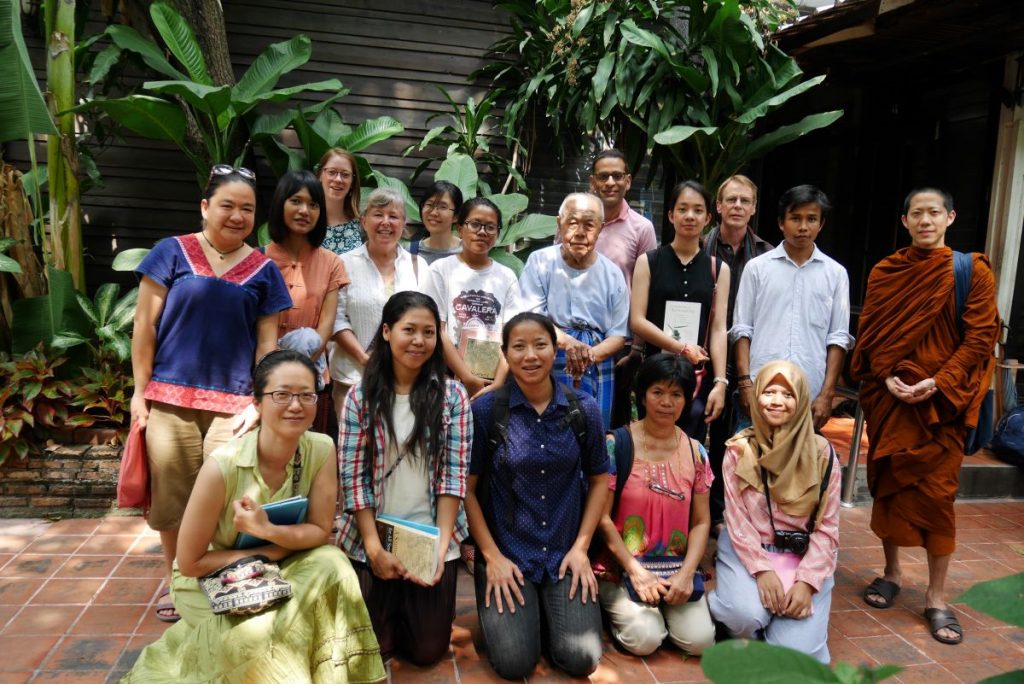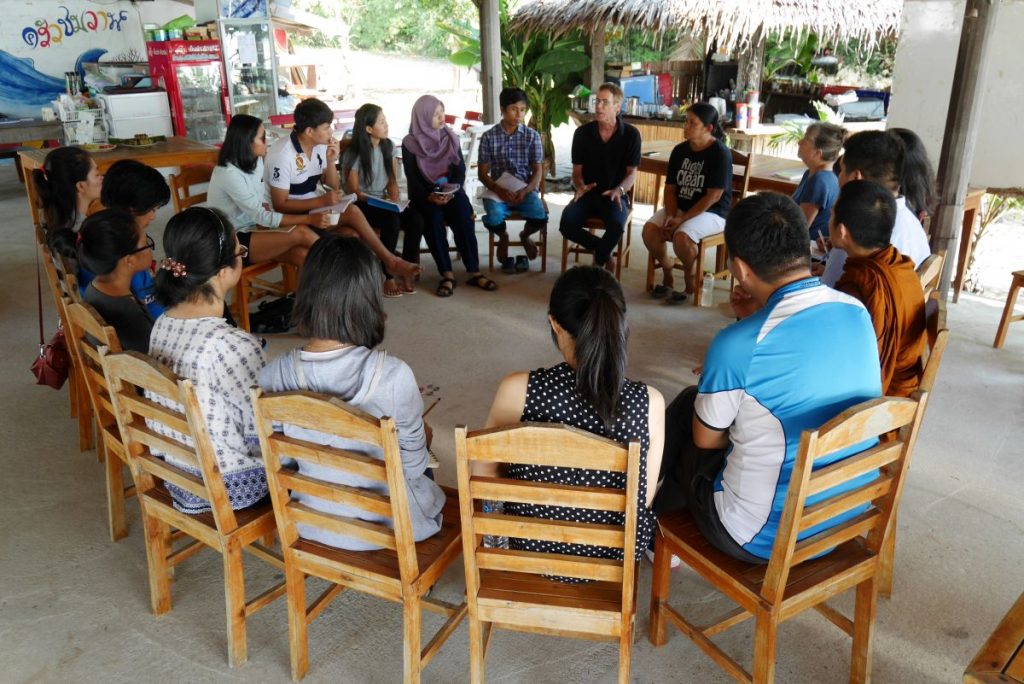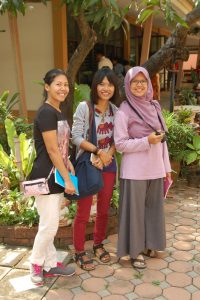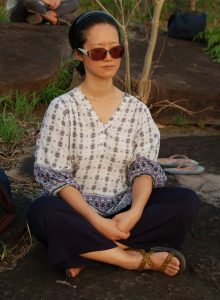
First Reflections on the School of English for Engaged Social Service 2018 Program—and Voices of Our Students

Students from SENS 2018 met Thai dissident Sulak Sivarkasa at his home in Bangkok January 27, 2018
The School of English for Engaged Social Service (SENS) is a place for learning English as a tool for leadership, self-cultivation, and social transformation. It is a three-month course that takes place annually from January to April at the Wongsanit Ashram near Bangkok.
How to Cultivate Leadership
It is very difficult to set a life direction or to lead others if you are doubtful or unsure of your own voice, of your own value, or of your own place in the world. Mindful and compassionate leadership is urgently needed in the world at this time, yet many of us are in fact doubtful.
In SENS we recognize that this doubt is widespread, for many reasons. It is a doubt that can be especially deep for women, for members of minority ethnic groups or oppressed nationalities, or for those who grew up in challenging circumstances. Yet we know on principle and from experience that every human being who receives the necessary support has the potential for profound leadership. What is that necessary support?
Five kinds of support we try to provide in the SENS program are:
1. Appreciation and Listening. We do everything we can to appreciate the beauty and goodness of each participant in the course, as they are when we first meet them, blemishes and all. We do this by appreciating them verbally, by soliciting their stories and opinions, and by listening to them with genuine respect and thoughtful attention. We de-emphasize critique, because everyone has been criticized and corrected so much that they become overly watchful of what they do, fearful that they won’t do something right… or worse, that they could never be right enough. We think our students, like all of us, need to be reminded of what is already right. Once they know we genuinely see their goodness and beauty, it is quite easy for them to accept suggestions, critiques, and corrections when needed.
2. Confidence. Secondly, we demonstrate our confidence in the students by assuming and stating that they all have the potential to be leaders in some social sphere or another. Our view is that all human beings can develop the qualities of genuine leaders, such as integrity, kindness, flexibility, and a willingness to think about the good of everyone. We begin by acknowledging the ways in which students already manifest these qualities to varying degrees. And we consistently affirm to the students that they can do things they may be afraid to try.

The SENS group meets with grassroots community leader Korn-Uma Pongnoi in Bo Nok, Thailand
3. Inspiration Towards Leadership. Our aim throughout the course is to provide alternative and approachable models of leadership that are based on peer relations and mutual respect, rather than on hierarchical relationships. In the work team we do our best to practice a kind of leadership that is strong in setting a tone and in doing what needs to be done for the success of our learning project, while also allowing ourselves to be vulnerable and accepting that we too will make mistakes. We take students on field trips to meet individuals who are outstanding leaders in one dimension or another, and students interact with them through interviews and discussions in a small group setting. In this way we support the students’ moral imaginations, for as they see the good that others have done, often against terrible odds, they begin to have a larger picture of what they too could do. Through workshops our students work closely for two or three-day periods with individuals who offer their skills in direct support of the students. Those experiences also clearly inspire the students to consider more deeply how they themselves could lead, train, or facilitate small groups. Finally, we ask the students to do research and give a presentation on a leader they would like to emulate.
4. Demonstrating the Need for Authentic Leaders. Our inspiration towards a new kind of leadership is strengthened by our exploration with the students of the major crises facing humanity at present. These crises include climate change, severe social inequality, the difficulty of realizing genuine democracy, and the use of violence as a method of attaining social or political goals. Students are further motivated to step up and take leadership when they see how dire the situation is, and the extent to which many established leaders ignore or downplay the seriousness of these threats.
5. Tracking the Growth of Each Participant. Finally, we make an effort to get to know each of the participants in the course well enough to know what kind of support each one specifically needs. We try to keep track of their personal growth throughout the course, so that they can overcome even very personal and subtle but persistent obstacles. In doing so we build on ancient forms of mentorship that require the teacher to be aware of the particular needs and difficulties of each student, and to take the time to devise a plan and to respond appropriately. In this way we challenge the impersonal and distant character of some forms of contemporary teaching. We also hope to model what we regard as a deeper form of solidarity in the teacher’s commitment to the student, and to make this kind of leadership seem normal, desirable, and attainable to the students.

L to R, Thet Nwe Soe and Phoo Pwint (Myanmar), Annisa Hasanah (Indonesia)
Learning how to integrate these five kinds of support most effectively for each new group of participants is a process that is at the heart of what we do. It requires that we continue to fine-tune when we succeed and seek to understand and devise alternative strategies when outcomes are not what we had hoped for. We’re pleased to report that we have become consistently better at determining how to support both individual participants and the group as a whole, as they work to realize their vast human and leadership potentials.
As evidence of our successes, we include here some of the reflections and goals that students shared at the 2018 SENS graduation ceremony held on April 4, 2018, generously hosted by Dr. Pichai at his Maenam Resort Nakhon Chaisri. Students crafted their own statements, but they received help with English phrasing, and their final statements have been edited for clarity.
We offer a limited selection of students’ reflections here, but we hope to offer more of our students’ voices, and share more about what we learned this year, in upcoming reports. If you are inspired by what you read here, you may help in one of these ways: 1) by spreading the word about the SENS programs; 2) by donating to the SENS Scholarship Fund: https://inebinstitute.org/donation/; or 3) by sponsoring a student in one of our upcoming programs. Next year’s course runs from January 6 to April 3, 2019. Those who would like to apply can do so at https://inebinstitute.org/apply/
Excerpts from Statements by SENS 2018 Students:

Sae Rob Lee (South Korea)
Sae Rob Lee – Jungto Society, South Korea
“For the benefit of all sentient beings.” In our Korean historical DNA, this commitment has been working deeply in our unconscious. …. My goal is to live by this teaching until I die. …. Thanks to this course, SENS, I’ve met engaged Buddhist practitioners, grassroots movement leaders, and learned about many social activities in Thailand. It is very hopeful that there are so many social changers—more than I expected. For a long time, I’ve concentrated on domestic social issues, but now I’ve changed. I want to work for more international or global issues. SENS gave me a chance to have a wider perspective and to be confident to communicate with international workers. We are not separated, but connected, so that we can cooperate in many ways. This is my great experience here.
A Student Who Wishes to Remain Anonymous
I see many new possibilities and learned a lot through this course. Through this program I have learned:
• To be an effective leader you need to be able to respond to challenges with intelligence, strategy, and sincerity.
• About the socialization and internalization of gender inequality through two wonderful women, Ouyporn and Ginger.
• How important it is to have Kalyanamitra in one’s life.
• When people have the same values, they naturally come together in unison in some ways.
• The importance of listening to what other people have to say.
• How climate change impacts everything and everyone’s life, and that even our civilization is at stake.
Thet Nwe Soe – Metta Development Foundation, Myanmar
As an adult, I haven’t shared my feelings with my parents that much. But learning counseling has encouraged me to share more with them and also to listen to them. …. Before this course, I didn’t have proper goals for my life. I just tried my best wherever I was or whatever I was doing. But now I see the value of identifying my goals and the steps I need to be able to reach them.

Students of SENS 2018. From L to R, Samkham Meunsy (Laos), Sabin Rongpipi (Assam, India), Thet Nwe Soe, (Myanmar)
Samkham Meunsy – Participatory Development Training Center (PADETC), Laos
I want to create a space in the countryside where youth can come to learn skills outside of school and access resources for personal development, including scholarships to study abroad, workshops and trainings, as well as community and network-building. These are not new ideas. But this course gave me the confidence I needed to move forward with them. Thank you to the SENS community and to all of our supporters for giving me the opportunity to learn more English.

Phoo Pwint gives her statement at the graduation ceremony.
Phoo Pwint – Kalyana Mitta Development Foundation, Myanmar
Previously, I stood for my Myanmar people; now I realize I need to stand for all living things. Because we have the same problems and we need to solve them all together. English language is a tool for social change. Therefore, it can be applied to connect to a global network. …. I decided to set up my goals for after this course as follows:
• To do regular practice for improving my English skills into advanced level in 2018.
• To listen deeply to my friends and community when they need someone to listen.
• To do research about the traditional environ-mental conservation customs and beliefs of ethnic groups and how to create an environ-mentally friendly culture in my country. I aim to complete this research within two years.
• To initiate an Eco Campus Movement at universities in my country that will go broader and deeper than it has before.
This is an expanded version of an article by Ted Mayer published in Seeds of Peace Vol. 34, No. 2 May-August, 2018
Download PDF First Reflections on the SENS 2018 Program and Voices of Students – Final Pls Share

Recent Comments